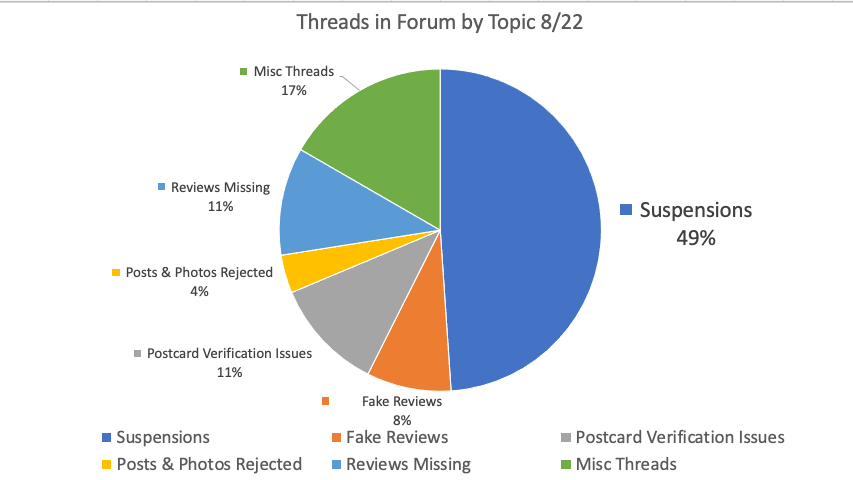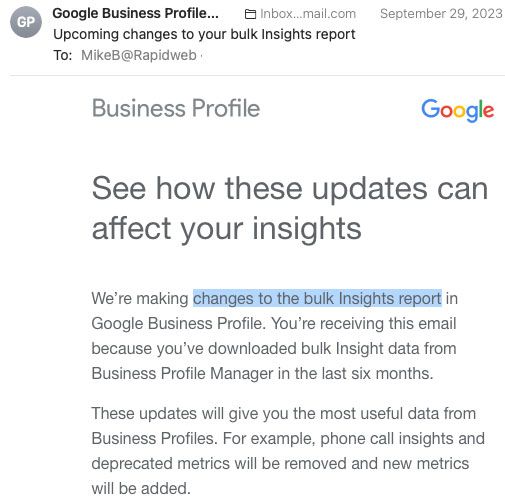Google Listings Clean-up, Dashboard Comeback?, Review Fraud Victim

Google's Listings Clean-up
Over the past two years, suspensions have been a big percentage of GBP Forum requests, especially for service area businesses (SAB). Google required re-verification, including live video verification. Reinstated listings were often re-suspended. Google also rolled out near real-time video verification for others, which is harder to fake than voice/postcard verification. Even minor listings updates, if not fully trusted, now trigger the new verification process. And newly created listings often require two-factor verification, which may succeed with the postcard, but then require video verification. Businesses that claim to move often are not approved via re-verification. Bulk listings, which previously got a pass, often must use video verification – difficult for multi-location businesses. As part of this "clean up," Google created better forms and implemented a more streamlined "one and done" re-incluson process for suspended business. But once you get your listing approved, Google has a 7 - 14 day "sandbox" that prevents newly listed businesses from uploading images, adding posts or making other significant changes. Back in 2008, Google's Carter Maslan told David Mihm and me that they knew about these abuses and allowed them. This was so, in the future, Google could "innoculate" the index. Now that Google effectively has a local monopoly, and is under intense government scrutiny, that "inoculation" is apparently finally happening.

Our take:
- New businesses, SABs, home services, business moving or with less than a perfect trust score should be prepared to deal with this process.
- It's a double edged sword, which will reduce (not eliminate) spam but make it harder for new, legit businesses to become verified.
- Google's definition of "trust" is somewhat opaque. Minimally, have a fully indexed website, official documents (DBAs, taxes), trusted data supplier citations (e.g., DataAxle). Be prepared to prove you're a real business.
Bulk Dashboard Comeback?
The GBP Bulk Dashboard, aka Business Profile Manager, has been the red-headed stepchild of the GBP editing experience. It was (and remains) full of bugs and UX oddities, making it a struggle to use. With the rollout of the new Google Business Profile rebrand in 2021, the GBP search editing UI (aka NMX) also started rolling out. Because of the Dashboard's lack of development, David Mihm felt it was "toast." I was naively confident Google would bring it up to basic levels of functionality. In November 2021, David and I bet on the Dashboards' future. Despite my naive confidence, I lost the bet. In fact, the Dashboard experience has gotten worse for multi-location businesses that were forced from the Dashboard into the NMX. This past week Google actually rolled out an update. The new Bulk Insights download has all the new GBP Insights data points introduced over the past two years. As Orson Wells once said "If you want a happy ending, that depends, of course, on where you stop your story." I actually once again believe, perhaps still naively, that the story of the Google Business Profile Manager isn't over and that it will finally get some love. Maybe I can win that beer back if David is up for another bet?

Our take:
- It is curious that after two years, Google is once again adding features to the Business Profile Manager.
- The sad state of bugs and UX issues has driven most multi-location users toward more functional third-party apps that use the GBP API.
- Simple features like bulk updating never really worked and should be the first order of business for Google to address.
Google on Review Fraud: 'We Are the Victims'
Google can often say something and mean something totally different. In a comment for the FTC rulemaking process about review fraud, Google noted, "the amount of [review fraud] ... is less than 1% of all of the content viewed on Maps." Let's restate that more accurately: Google Maps "content" types are viewed billions and billions of times monthly. As likely defined by Google, content includes driving directions, StreetView, images, GBP impressions, phone look ups, Q&As, star ratings, etc. In the aggregate, all that is seen 100x more than fake reviews. Did Google lie? Not really. But it does beggar belief when Google positions itself as the real victim of review fraud. "Businesses may also have strong incentives to buy positive reviews, which exacerbates the problem," it says. "In addition, Google does not always have full visibility into or control over certain types of [3rd party] reviews [that we include in the results]." If Google doesn't trust third party reviews, why include them? Indeed, Google created review-fraud incentives: more reviews and higher ratings increase visibility and drive clicks and conversions. Google had minimal review moderation until last year, which allowed fake reviews to flourish. For Google to say, "The FTC should be focused on the bad actors perpetuating fake reviews, not the platforms working hard to stop them" is like saying the best way to fight systemic prejudice is for people to just play nice.

Our take:
- We still have no concrete idea of how many times fake reviews/ratings impact consumer purchases but it's significantly more than 1%.
- Did Google allow suspicious reviews, to boost volume, to dominate local? Google has now upgraded moderation, removing many fakes. Whether that's enough to salvage its reviews' credibility remains to be seen.
- Though it legally cannot the FTC should regulate, not just the buyers and sellers of fake reviews, but Google itself as the true cause of this fiasco.
Recent Analysis
- Near Memo episode 130: So Clicks are a ranking signal? Google comments to FTC on review fraud, Bard gets enhanced with extensions.
Short Takes
- All About Google Local Services Ads, highlights Crystal Horton and all you need to know about and recent changes.
- Darren Shaw on outranking competitiors with local SEO tools.
- Understanding the role of explicit vs. implicit searches in local SEO.
- Good summary of the increasing role entities play in search and SEO.
- Who's cheating on Yelp? A new index lists all of them.
- Indoor maps are underutilized; a new program simplifies their creation.
- Can Google (Maps) be liable for a traffic death caused by bad information if Google was repeatedly told it was wrong?
- Cops increasingly turn to Google data (search, maps/location) even for non-violent offenses (Apple News+ or Bloomberg).
- What you need to know about NYC short-term rental restrictions and GBP.
Listen to our latest podcast.

How can we make this better? Email us with suggestions and recommendations.
